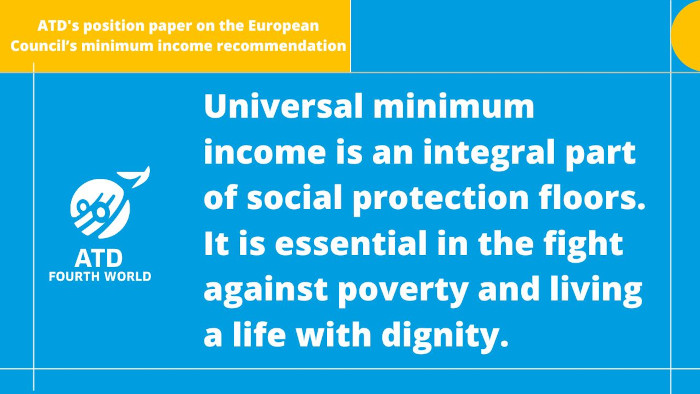European Council’s Minimum Income Recommendation

A first, but insufficient step in the right direction
The International Movement ATD Fourth World has worked for decades with people experiencing poverty, always trying to reach those furthest behind. ATD has consistently advocated for establishing social protection floors1 in all countries. More robust social protection, designed with the contribution of all stakeholders, should be the norm in all European countries. Universal minimum income schemes2 are an integral part of social protection floors and are essential in the fight against poverty and living a life with dignity.
Universal Minimum Income schemes reduce the stigma of those dependent on social benefits and decrease the non-take-up of rights3. These schemes are vital to the most vulnerable in society, who often face multiple challenges, e.g. people living in extreme poverty, individuals who lack stable housing, low-income wage earners, the long-term unemployed and underemployed, those with medical issues, and people with disabilities.
Design and protectiveness vary
All European Union member states have implemented some minimum income schemes, but their design and protectiveness vary. Often, they are unable to lift people out of poverty, and their efficiency is limited. As a result, people don’t have the strength and the means to break the cycle of poverty (created by discrimination and shame). The Covid 19 crisis accentuated this gap. According to Eurostat, in 2019, 92.4 million people were at risk of poverty or social exclusion, while in 2021, this number was estimated as 95.4 million people.
The International Movement ATD Fourth World welcomes the European Council’s adoption on January 30, 2023, of the recommendation on an adequate minimum income ensuring active inclusion. The effort of the European institution on this vital matter is noted. A legal-based, empowering minimum income will significantly impact people experiencing poverty and is a pillar of an equitable society.
ATD Fourth World supports the position paper and analysis published by EAPN regarding the minimum income recommendation. However, a few additional points need to be highlighted and reaffirmed:
Individualisation of the minimum income scheme:
ATD endorses the potential individualisation of the minimum income scheme. The possibility for individuals to request a minimum income, independent of those living in the household, will provide autonomy to a part of the population, such as women, people with disabilities, and young people.
A positive step against non-take-up:
For years, the issue of non-take-up has been questioned by ATD. We have worked directly with the special rapporteur on human rights and extreme poverty in his report: Non-take-up of rights in the context of social protection. The European Council’s recommendation addresses the issue of non-take-up and is a positive step in offering real solutions for the states and stakeholders.
Socio-economic discrimination: an emerging issue:
Discrimination based on socioeconomic status is experienced daily by people living in poverty. Difficulties in obtaining medical appointments, jobs, housing, and enrolling children in daycare or schools are a violation of their rights. Recognised by scientific studies, this discrimination, starting with stigmatisation and unconscious bias profoundly impacts mental health. ATD Fourth World values the awareness of this topic and the recommendation to “combat stigmatisation and unconscious bias attached to poverty and social exclusion”. However, we are calling on European institutions to address this issue independently and more thoroughly.
Participation of those concerned:
Often ignored and under-represented in the political field and the media, people in extreme poverty can have the impression they have nothing to contribute to society. However, their active participation is an influential factor for social cohesion, a guarantee of progress in our democracies and a condition for realising fundamental rights for all. Considering those in persistent poverty as full partners is essential to building a society without exclusion. They expose the inadequacies in our communities, and their life experiences are critical to creating policies and a more just and supportive society. From this perspective, it is deeply regrettable that those concerned by these measures -people directly impacted by poverty- are excluded from participating.
This recommendation is a step in the right direction in eradicating poverty; however, attaining financial security for everyone is not enough to reach this goal. Money is not enough to get out of poverty. For those who have lived in poverty for years or generations, support is needed in order to achieve it.
Download ATD’s position paper on the European Council’s minimum income recommendation

